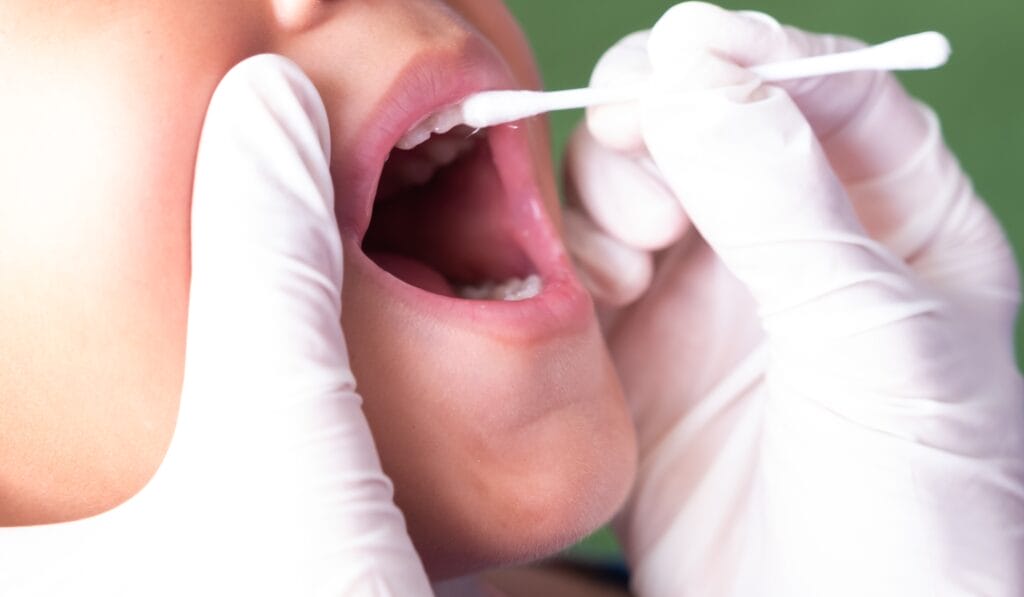Introduction
Fluoride is a naturally occurring mineral that plays a crucial role in maintaining good oral health. It helps build strong teeth and prevent tooth decay by strengthening tooth enamel and reducing the risk of cavities. For more than 70 years, most tap water in America has been fluoridated to provide small amounts of fluoride and reduce tooth decay. The Centers for Disease Control and Prevention (CDC) state that fluoridated water has reduced tooth decay by about 25%. In addition to fluoridated water, fluoride treatments offer even more significant benefits to protect teeth and prevent cavities.
Fluoride treatments are typically professional treatments that contain a high concentration of fluoride. They are applied to a person’s teeth by a dentist or hygienist to improve oral health and reduce the risk of cavities. These treatments can take the form of solutions, gels, foams, or varnishes. There are also some high-concentration fluoride treatments that people can use at home under the specific direction of a dentist. These treatments contain much higher doses of fluoride and may offer more rapid benefits.
In this article, we will explore the benefits and side effects of fluoride and fluoride treatment, as well as treatment recommendations. We will also address common myths and concerns about fluoride and identify who can benefit the most from fluoride treatments. By understanding the safety and benefits of fluoride treatment, you can make informed decisions about your oral health.
Understanding Fluoride and Its Role in Oral Health
Fluoride is a mineral that is naturally found in soil, water, and many foods. It is widely recognized for its role in maintaining good oral health. Fluoride works by strengthening tooth enamel, the outer layer of the teeth, and making them more resistant to decay. It also helps to repair weak enamel by reabsorbing minerals such as calcium and phosphate.
In addition to naturally occurring fluoride, fluoride is also added to drinking water in many communities. This process, known as water fluoridation, helps to ensure that people receive a consistent amount of fluoride for optimal oral health. Fluoride is also a key ingredient in fluoride toothpaste, which is widely used for daily oral hygiene.
The Basics of Fluoride
Water fluoridation is a public health measure that involves adjusting the fluoride content in drinking water to a level that helps prevent tooth decay. In the United States, most tap water contains small amounts of fluoride, usually between 0.7 to 1.2 milligrams per liter (mg/L). This fluoridated water has been proven to be effective in reducing the risk of tooth decay.
Tooth decay is a common dental problem that occurs when acids produced by bacteria in the mouth erode the tooth enamel, leading to cavities. By drinking fluoridated water, individuals can benefit from the protective effects of fluoride, which helps to strengthen tooth enamel and make it more resistant to acid attacks. This reduces the risk of tooth decay and the need for expensive dental treatments.
How Fluoride Works to Prevent Tooth Decay
Fluoride works to prevent tooth decay by several mechanisms. First, it helps to strengthen tooth enamel by becoming incorporated into the tooth structure during tooth development. This process, known as enamel fluorosis, makes the enamel more resistant to acid attacks from bacteria in the mouth.
Second, fluoride helps to reduce the amount of acid produced by bacteria in the mouth. Bacteria feed on sugar and produce acids as a byproduct, which can erode tooth enamel and lead to cavities. By inhibiting the growth of these acid-producing bacteria, fluoride helps to slow down or even reverse the development of cavities.
It is important to note that while fluoride is beneficial in preventing tooth decay, excessive fluoride intake can lead to a condition called dental fluorosis. Dental fluorosis is a cosmetic condition that causes white streaks or spots on the teeth. It usually occurs in children who consume too much fluoride during tooth development. However, when used appropriately, fluoride treatments offer significant benefits in preventing tooth decay and maintaining oral health.
The Benefits of Fluoride Treatment
Fluoride treatments offer a range of benefits for oral health. They play a crucial role in disease control and can help prevent dental caries (cavities) in both primary and permanent teeth. By strengthening tooth enamel, fluoride treatments make teeth more resistant to acid attacks and reduce the risk of cavities.
Topical fluoride treatments, such as fluoride varnish, are particularly effective in delivering fluoride directly to the tooth surface. This targeted application ensures maximum exposure to fluoride and provides long-lasting protection against tooth decay. By incorporating fluoride treatments into your oral health routine, you can prolong the life of your teeth and minimize the need for extensive dental work.
Strengthening Tooth Enamel
One of the key benefits of fluoride treatments is the strengthening of tooth enamel. Tooth enamel is the hard outer layer of the teeth that protects against decay. It is constantly exposed to acids from food and bacteria in the mouth, which can erode the enamel and lead to cavities.
Fluoride helps to strengthen tooth enamel by becoming incorporated into its structure. When teeth are developing, fluoride joins the enamel and makes it more resistant to acid attacks. This makes permanent teeth less vulnerable to bacteria and cavities throughout life.
For young children whose teeth are still developing, fluoride treatments are especially beneficial. The exposure to fluoride from sources such as tap water and dental products helps to strengthen their tooth enamel and reduce the risk of tooth decay. Starting fluoride treatments early can set the foundation for a lifetime of good oral health.
The Safety Profile of Fluoride Use
Fluoride has been extensively studied and has a long history of safe use in maintaining good oral health. The safety profile of fluoride is supported by scientific research and the recommendations of reputable organizations, such as the American Dental Association (ADA) and the Centers for Disease Control and Prevention (CDC).
Fluoride intake from various sources, including drinking water, toothpaste, and professional fluoride treatments, is carefully regulated to ensure optimal oral health benefits without exceeding safe limits. Water supplies are monitored to maintain the appropriate level of fluoride, and fluoride toothpaste and treatments are formulated to deliver the right amount of fluoride for effective prevention of tooth decay.
When used according to the recommended guidelines, fluoride is considered safe for most individuals. However, excessive fluoride intake, particularly in young children, can lead to dental fluorosis, a cosmetic condition that affects the appearance of the teeth. It is important to follow dental professionals’ advice and use fluoride products as directed to minimize the risk of adverse effects.
Understanding Fluoride Dosage and Safety Guidelines
Fluoride dosage and safety guidelines are established to ensure the optimal use of fluoride for preventing tooth decay while minimizing the risk of adverse effects. These guidelines take into account factors such as age, risk of cavities, and fluoride intake from various sources.
For most individuals, drinking tap water with optimal fluoride levels and brushing teeth twice a day with fluoridated toothpaste is sufficient to maintain good oral health. However, for individuals at a higher risk of cavities, additional fluoride treatments may be recommended.
It is important to follow the guidance of dental professionals regarding the use of fluoride mouth rinses or other supplemental fluoride products. These products should be used according to the specified dosage and frequency to ensure safe and effective prevention of tooth decay.
By understanding the appropriate dosage and safety guidelines, individuals can make informed decisions about their fluoride use and maintain good oral health without exceeding safe limits.
Identifying Who Can Benefit Most from Fluoride Treatments
While fluoride treatments offer benefits for individuals of all ages, there are certain groups who can benefit the most from these treatments. Individuals with weakened dental enamel, such as those with a history of cavities or tooth sensitivity, may benefit from fluoride treatments to strengthen their enamel and reduce the risk of further damage.
Fluoride treatments can be especially beneficial for young children whose teeth are still developing. The targeted application of fluoride in the form of a gel or varnish can help strengthen their tooth enamel and protect against cavities.
In addition, individuals with a higher risk of cavities, such as those with dry mouth or a diet high in sugars, may benefit from regular fluoride treatments to prevent tooth decay and maintain good oral health.
Fluoride Treatment Maintenance and Care
After receiving fluoride treatment, it is important to maintain good oral hygiene to maximize its benefits. Brush your teeth twice a day with fluoridated toothpaste, focusing on all tooth surfaces and paying attention to the gumline. Consider using a toothpaste that contains stannous fluoride, as it provides additional protection against tooth decay.
In addition to brushing, floss daily to remove plaque and food particles from between your teeth. Visit your dentist regularly for check-ups and cleanings to monitor your oral health and address any early signs of tooth decay. By taking these steps, you can ensure that your fluoride treatment continues to protect your teeth and maintain your oral health.
Daily Oral Care Tips
In addition to receiving fluoride treatment, there are several daily oral care tips to help maintain optimal oral health. Brush your teeth at least twice a day with fluoridated toothpaste, using a soft-bristled toothbrush. Make sure to brush all tooth surfaces, including the gumline, and spend at least two minutes brushing.
Floss daily to remove plaque and food particles from between your teeth. Consider using a fluoride mouthwash as an additional preventive measure. If you have sensitive teeth, use a toothpaste designed for sensitive teeth that contains fluoride to help strengthen and protect your enamel.
Avoid consuming excessive amounts of sugary foods and beverages, as they can contribute to tooth decay. Drink plenty of water throughout the day, as it helps rinse away food particles and bacteria. By following these daily oral care tips, you can maintain a healthy smile and support the benefits of fluoride treatment.
Regular Dental Check-ups and Fluoride Updates
Regular dental check-ups are essential to monitor your oral health and ensure that your fluoride treatment is effective. During these check-ups, your dentist will evaluate the condition of your teeth and determine if any adjustments or updates to your fluoride treatment are necessary.
For individuals at a higher risk of cavities, additional fluoride treatments may be recommended. Your dentist may prescribe a fluoride gel or foam that you can apply at home. It is important to follow your dentist’s instructions for the use of these products and maintain regular dental check-ups to monitor your oral health.
If you live in an area without community water fluoridation, your dentist may recommend additional fluoride treatments to ensure that you receive the necessary benefits. By staying informed about the latest fluoride updates and working closely with your dentist, you can maintain optimal oral health and protect your teeth from cavities.
Conclusion
In conclusion, fluoride treatment plays a crucial role in maintaining optimal oral health by strengthening enamel and reversing early signs of decay. Understanding the safety and benefits of fluoride is essential for both children and adults to prevent cavities effectively. Professional fluoride applications offer stronger protection compared to at-home options, ensuring a higher level of care. By following recommended guidelines and regular dental check-ups, individuals can benefit from fluoride treatments while minimizing potential side effects. Stay informed and prioritize your oral health to enjoy the lasting advantages of fluoride treatment. Contact us at Creekside Dental for more!
 Meet Dr. Leffler
Meet Dr. Leffler
 Meet the Team
Meet the Team
 Dental Membership Plan
Dental Membership Plan
 Insurance Information
Insurance Information
 Patient Forms
Patient Forms
 Online Bill Pay
Online Bill Pay
 Your First Visit
Your First Visit





